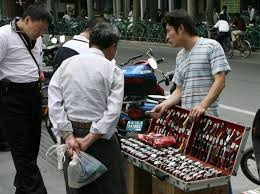Caveat Civis
 We know the phrase "caveat emptor," rendered loosely as "Let the buyer beware."
We know the phrase "caveat emptor," rendered loosely as "Let the buyer beware."If you are buying an authentic Rollex from a guy on a streetcorner, it's on you to make sure that it's an actual functioning watch. If you have bought a used car that turns out to be a four-wheel abomination, while there may be some lemon laws that give you a shot at recovering your losses, it's still on you.
It's annoying for emptors to have to caveat. If you're buying a house and the seller says to your face when asked directly, "No, we never have problems with rainwater pouring down the driveway and into the garage," it's annoying that later, as you're shop-vacking the pond in your garage, you have to kick yourself for actually trusting a fellow human being. It's annoying to realize that you've been suckered by an advertisement that lies, and that the law says that the puffery was so obvious that it was on you to nkow that you were being lied to. It's time-consuming to have to examine every single thing you buy before you put down your money, and there's a certain slow-building corrosiveness to operating under the assumption that you can't trust your fellow humans.
I am always mystified by crooks, by people who make a living doing things like calling little old ladies and conning them into handing over their bank account information. There's something extra discouraging about having to explain to an older relative that she must stop trusting people, but should just assume that anyone who calls her on the phone is probably a liar and a cheat unless proven otherwise.
But we accept all of these things as the price of doing business in a messy, imperfect, human-inhabited world. Caveat emptor.
But we mostly don't expect to have to live by the phrase "Caveat civis"-- let the citizen beware.
Our elected officials, and particularly the people the hire to do the day to day work, who keep the wheels of government and cities and towns turning-- we're supposed to be able to trust those people. Yeah, we know the big shots may very well be crooked, and bureaucracy can be dull and thick-- but the rest of the government is supposed to keep things running smoothly.
We assume, for instance, that when we go to drive across a bridge, it won't collapse. We assume that large objects like cars have been checked by someone to make sure they won't kill us under ordinary circumstances. And we figure mostly when we turn on a water tap, the water will be fit to drink.
As much as we bitch about our government, we still trust it in the small-but-important ways. We expect the lights to be on. We expect the roads to be passable. We expect our currency to be worth something. And when things have been certified by The Authorties to be safe for our use, we assume they are so.
Betrayals like the discovery, first in Flint and now all over, that the water flowing from the tap is poisoned are doubly troubling because we trusted these guys. When we come home after a long, CURMUDGUCATION: Caveat Civis:
